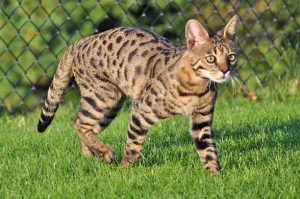Dr. Olsen’s Breed Spotlight: The Savannah Cat
 Every once in a while I will spotlight a breed in my newsletters. I have done a couple of dog breeds, but this month I have decided to write one for our furry, feline friends. The breed is called the Savannah Cat. It is a cross between the wild African Serval Cat and a domestic breed—most commonly the Bengals, Egyptian Maus and Oriental Shorthairs. The actual first Savannah was born on April 7, 1986 from parents that were the Serval cat and a Siamese. The kitten’s name was ironically named Savannah. After several years of breeding and creating the new breed standard, the new breed was recognized in 2012 by the International Cat Association.
Every once in a while I will spotlight a breed in my newsletters. I have done a couple of dog breeds, but this month I have decided to write one for our furry, feline friends. The breed is called the Savannah Cat. It is a cross between the wild African Serval Cat and a domestic breed—most commonly the Bengals, Egyptian Maus and Oriental Shorthairs. The actual first Savannah was born on April 7, 1986 from parents that were the Serval cat and a Siamese. The kitten’s name was ironically named Savannah. After several years of breeding and creating the new breed standard, the new breed was recognized in 2012 by the International Cat Association.
Most Savannahs have a tall, lean build that gives them the appearance of greater size than their actual weight. This trait has given them the title as being the world’s tallest domestic cat breed in the Guinness Book of World Records since 2006. They are long legged, and if they were athletes, they would be heavily recruited by basketball teams! The Savannah’s can weigh between 8 to 20 pounds and come in many different colors and patterns, such as black, brown, or black spotted tabby; black silver spotted tabby; or black smoke. Most have solid black or dark brown spots on golden, cream, sandy or white backgrounds. They stand out for their bold, solid markings, which can be round, oval, or elongated. Other colors and patterns do exist and can be registered into the breed register but cannot be shown. Savannahs have a triangular head that is supported with a long neck and topped by large, wide ears. They have medium sized eyes that can be any color but are usually blue at birth. This breed takes about 3 years to reach maturity and their back legs are usually a little longer than their front.
The Savannahs are NOT a sweet, quiet lap cat. However they are very active, confident and enjoy reacting with people and other cats. They are intelligent and curious and always looking for something interesting to do—the more adventurous the better. They have a knack for being quite mischievous and are not a good fit for owners that are away a lot or not active. So it may be best to have a companion for them.
This breed is not cheap to own, due to the confirmation of the breed standard, their temperament, demand and scarcity. The F1 Savannah cats which are 50% – 82% or higher wild blood can sell for up to $22,000 because mating is very difficult. They have very small litters and very low fertility. The F1 offspring do not like to be held, but like to be petted, scratched and be in contact with humans. They tend to gravitate to one person and get along with other pets just fine. F1’s are also the largest of the breed, where they can weigh up to 30 pounds. As more domestic blood introduced, the Savannahs will be smaller, but can be more enjoyable members of the family as far as personality goes.
So if you have a Savannah or even a domestic “four legged” furry feline friend, Olsen Veterinary would be happy to make sure that they remain healthy. Please call the office at 618-656-5868 if you have any concerns or would like to schedule an appointment. You can also go to our website and request an appointment. Our team would then be able to set that up.
